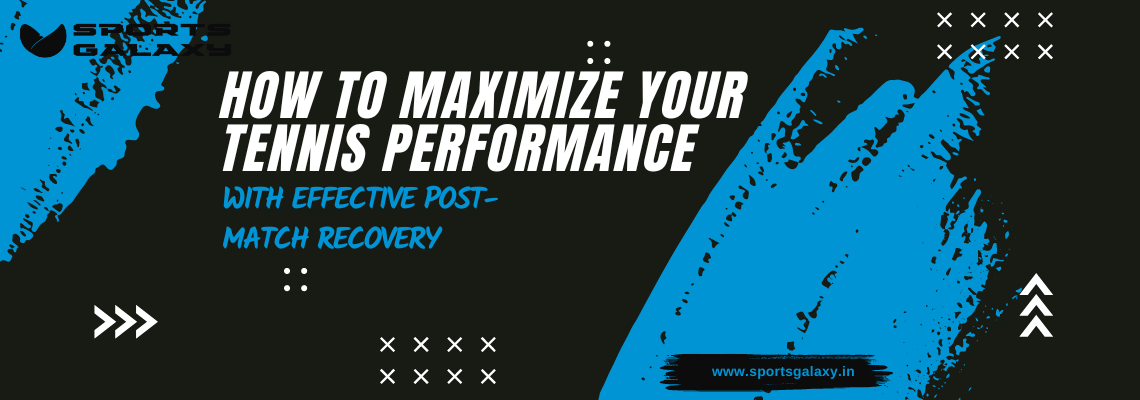How to Maximize Your Tennis Performance
How to Maximize Your Tennis Performance:
Tennis is a demanding sport that requires quick movements, endurance, and mental sharpness. After a match, it’s crucial to focus on recovery to boost your performance in future games and avoid injuries. In this blog, we’ll look at effective ways to recover after a match, including exercise, nutrition, and other helpful tips to help you play your best.
How to Maximize Your Tennis Performance
Exercise for Recovery
- Cool Down: After a tough match, let your body ease back from intense activity. Do some light jogging or cycling for 10-15 minutes to lower your heart rate and help your muscles recover.
- Stretching: Stretching helps keep your muscles flexible and reduces soreness. Try dynamic stretches like lunges, leg swings, and arm circles, which mimic tennis movements and help prevent muscle tightness.
- Foam Rolling: Use a foam roller to relieve tight muscles and improve blood flow. Roll over sore spots to ease tension and speed up your recovery.
Personal Training Methods
- Active Recovery: On rest days, try low-impact activities like swimming, cycling, or yoga. These activities help keep your blood flowing and aid in muscle repair.
- Cross-Training: Mix in other exercises like strength training to stay fit and avoid overuse injuries. Exercises like squats, lunges, and core work can strengthen your muscles and improve your game.
Food and Nutrition
- Rehydrate: Replace fluids lost during the match by drinking water, sports drinks, or coconut water. Aim to drink 16-20 ounces of fluids for every pound of sweat lost.
- Protein-Rich Foods: Eat foods high in protein, such as lean meats, fish, eggs, dairy, or plant-based options like beans. This helps your muscles recover faster if eaten within 30-60 minutes after the match.
- Carbohydrates: Carbs are essential for refueling. Choose complex carbs like whole grains, fruits, and vegetables to restore your energy and get ready for your next game.
- Anti-Inflammatory Foods: Reduce inflammation with foods rich in omega-3 fatty acids (like salmon and walnuts), antioxidants (like berries and leafy greens), and spices (like turmeric and ginger).
Other Tips for Recovery
- Quality Sleep: Get 7-9 hours of sleep each night to help your body repair and recover. Sleep is when your body heals and prepares for the next challenge.
- Recovery Tools: Use tools like cold packs, compression garments, and contrast baths (alternating between hot and cold water) to ease muscle soreness and reduce inflammation.
- Mental Recovery: Practice relaxation techniques like deep breathing, meditation, or visualization to calm your mind and stay focused.
Conclusion
Effective post-match recovery is key to maintaining peak performance. By following cool-down routines, staying hydrated, eating the right foods, and using recovery tools, you can speed up your recovery, prevent injuries, and keep playing your best.
FAQs
Why is post-match recovery important for tennis players?
Post-match recovery helps your body repair itself, reduces muscle soreness, and prevents injuries. It also prepares you for your next game by restoring energy levels and improving overall performance.
What are the best cool-down exercises after a tennis match?
Light aerobic exercises like jogging or cycling for 10-15 minutes are great for cooling down. Follow this with dynamic stretches such as lunges, leg swings, and arm circles to help your muscles recover.
How soon should I start rehydrating after a match?
It’s best to start rehydrating immediately after your match. Drink water, sports drinks, or coconut water to replenish fluids and electrolytes. Aim for 16-20 ounces of fluids for every pound lost during the match.
What kind of foods should I eat after a tennis match?
Focus on protein-rich foods like lean meats, fish, or beans to aid muscle repair. Include complex carbohydrates such as whole grains, fruits, and vegetables to restore energy. Don’t forget to add anti-inflammatory foods like berries and omega-3 rich options.
How long should I wait before eating a post-match meal?
Try to eat a snack with protein and carbohydrates within 30-60 minutes after your match. A balanced meal can follow within a few hours.
What is foam rolling, and how does it help with recovery?
Foam rolling involves using a foam roller to massage your muscles. It helps release tightness, improves blood flow, and reduces muscle stiffness, speeding up the recovery process.
How often should I engage in active recovery activities?
Active recovery activities, like swimming or yoga, can be done on rest days or between matches. Aim for a few sessions per week to keep your body in good condition and aid recovery.
How important is sleep for recovery after a tennis match?
Quality sleep is crucial for recovery. Aim for 7-9 hours per night to allow your body to repair tissues, release growth hormones, and consolidate skills and knowledge.
What are contrast baths, and how do they help with recovery?
Contrast baths involve alternating between hot and cold water immersion. This technique helps reduce inflammation, improve circulation, and ease muscle soreness.
Can mental relaxation techniques really improve my recovery?
Yes, mental relaxation techniques like deep breathing, meditation, and visualization can reduce stress and improve focus, which helps in overall recovery and performance readiness.



